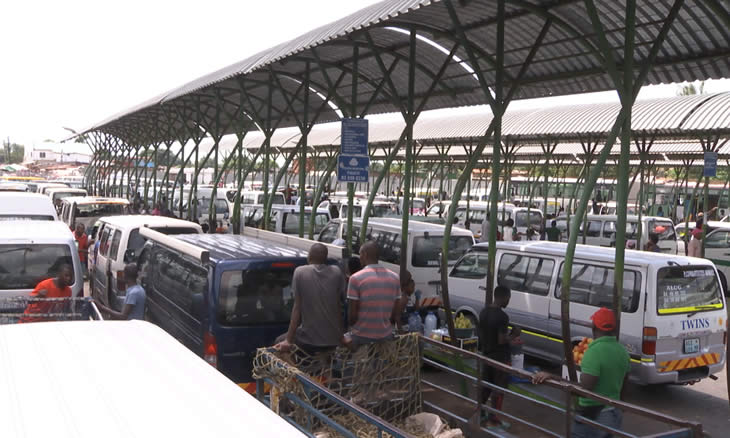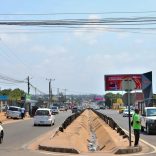Mozambique: Firms 'timidly' reopening one year after election riots - businesses
Mozambique: Xiquelene’s “inter-provincials” bring activity to a halt

Photo: O País
Inter-provincial transporters in Praça dos Combatentes, Maputo city, yesterday stopped their activities in protest at the allegedly unfair levying of fines by the Municipal Police. The strikers also demanded unfettered use of the Maputo Ring Road in pursuit of their business.
The situation returned to normal after the meeting between the plaintiffs and the Municipal Transport and Mobility Company.
Right at the entrance to the Praça dos Combatentes in Maputo, a particularly hectic scene attracted the attention. In fact, the place is always agitated. A little of everything is bought and sold there, but on Monday morning it was different.
There was the usual coming and going of semi-collective transportation vehicles, but the inter-provincial carriers were staying put. The facial expression of their drivers was not a pleasant sight. Around them, hundreds of people, including adults, children and the elderly who, were waiting with their luggage to depart for their destinations.
There was in fact a strike by the “Inter-provincials” at Praça dos Combatentes (or simply Xiquelene), in the city of Maputo. Behind it are the alleged unfair charges levied by the Municipal Police and the fact that the carriers are also prohibited from using the Maputo Ring Road. In fact, if they do use it, it is considered a shortening of the route, and susceptible to a fine.
“Our vehicles are full when they leave here. We did not load passengers en route, but when we use the Ring Road, we are fined 10,000 meticais on the pretence of altering our route, and our licenses do not support that,” Gustavo Chaúque, a carrier on the Maputo-Manjacaze route for 27 years, said.
That’s one issue. Another complaint is that a ticket purchased inside the park is required for every journey, but the “Interprovincianos” leave Xiquelene at 4:00 a.m., and tickets only start being sold after 7:00 a.m.. That makes no sense to transporters.
“We are charged a fee here inside the park, and we pay without a problem. Meanwhile, the people who sell tickets show up late, around 7:30 a.m., while the coaches leave at 4:00 or 5:00 a.m.. Then, when we get to Magoanine, they demand this ticket that we could not buy, and if we do not present it, we get fined 10,000 or 15,000 meticais,” Moisés Macamo, another inter-provincial carried, explained.
It is essentially these two issues that the carriers wanted to see resolved. “We are not going to leave here. We are not going to work,” another driver said.
Said and done. All morning long, there was no work done and no departure for passengers either. Not working, and no other way to travel. Those who arrived in Xiquelene early dozed or ate, waiting for some resolution.
“They are asking for answers, and don’t want to set off. If they are answered, there is no problem. They will transport us,” passenger Isabel Cossa said.
And while Isabel Cossa was disgusted with a situation she said she understood well, Josefina Macuácua, who was going to Gaza, was taken by surprise. “We didn’t know. We were surprised when we got here and found out that there was a strike. We don’t know what it’s about,” she sighed.
By Dário Cossa












Leave a Reply
Be the First to Comment!
You must be logged in to post a comment.
You must be logged in to post a comment.